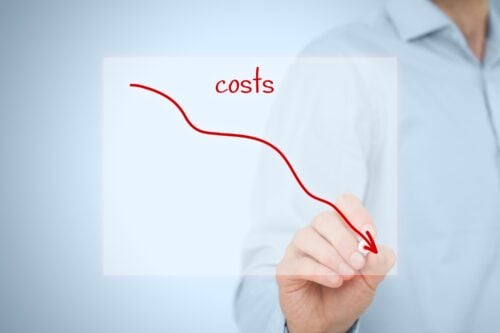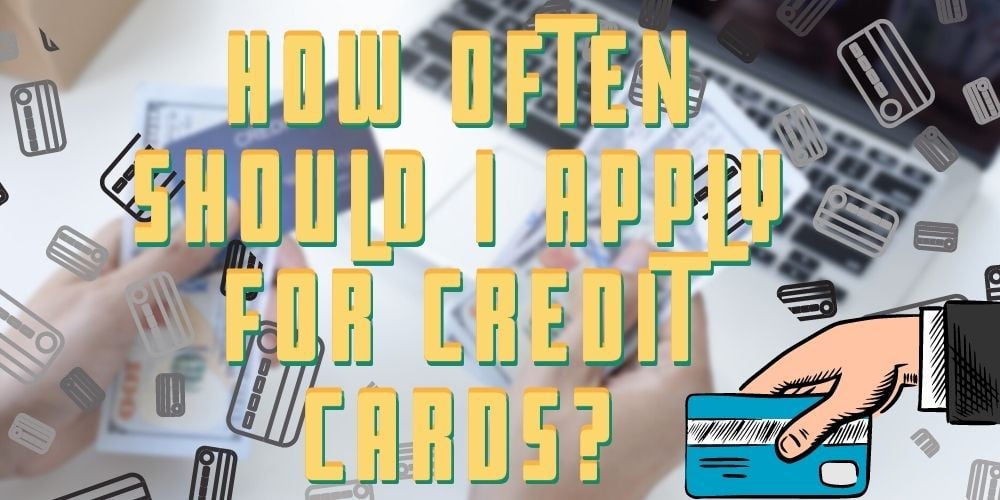How Often Should I Apply for Credit Cards?
It is best to wait for at least 90 days, and even better if you can do so for at least six months between two credit card applications.
Each one entails a new credit inquiry on the applicant’s credit score, reducing it by up to five points.
Several such instances might impact the overall score in a big way.

If multiple accounts get approved, but the user does not have a long-established credit history, the average age of accounts also gets impacted.
This is another negative factor in your credit reports.
Again, a credit card issuer may frown upon more than four to five such inquiries in a two-year period. It might see this as a sign of excess debt or mismanagement of personal finance.
This is especially true if the person is also trying to procure a more significant debt like a housing mortgage.
A lender will be very suspicious of multiple card applications when the applicant has such a profile.
How Long Should I Wait to Apply for Another Credit Card After Being Approved?
Try to wait for at least 90 days, ideally six months, before a new credit card application. Do this even if the first one was approved.
As mentioned earlier, there is an impact on the credit report for each inquiry made.
Multiple such checks can significantly reduce the score.

This will hamper your ability to take further debt, especially larger ones such as a mortgage or an auto loan.
Can You Apply for 2 Credit Cards Within a Week?
There is no restriction on applying to get two cards in one week. It may, however, cause credit score drops, as mentioned earlier.
Some credit card companies even limit the number of applications in a specific time interval.
For example, they may disallow more than one in six months and automatically reject it if they see another application in their system.
Should I Apply for 2 Credit Cards on the Same Day?
Applying for two cards on the same day is not a good idea.
Not only does it impact creditworthiness, but it can also lead to overspending if both applications get approved.
Moreover, doing so might negatively impact future credit applications, as lenders may view this behavior as suspicious.
How Many Points Does Your Credit Drop When You Open a Credit Card?
Opening a new credit card account causes a hard inquiry that may lead to a drop of up to five points in your score.
If the credit history is good, the drop might be lesser.

Thankfully, this is not permanent damage. The score usually recovers in a few months as long as there are no new credit-related issues.
The reason why this happens is that the card issuer assumes there must be some additional debt that is causing you to require a new card.
This is an assumption made by lenders; it may not necessarily be showing on your report. They do it to ensure that the applicant is not overexerting themself with too much debt.
How Many Are Too Many Credit Cards?
As a thumb rule, two to three credit cards are a good number to have. This is especially true if there are other types of debts in your kitty, such as mortgages or personal loans.
Having multiple credit card accounts makes it difficult to track payments.
This can increase the probability of default, negatively affecting credit scores.
It might also encourage profligate spending, thus increasing the overall debt-to-credit ratio. A poor ratio is very bad for your report.
That said, there may be some legit reasons why one might want to apply for a card:
- Attractive sign-up bonus
- 0% introductory rate
- Better credit limit/freebies, etc.

However, be wary of such offers if you already have a bad credit history.
Remember that a sign-up bonus may have a clawback clause, an introductory rate is usually only applicable for six months, and so on.
Combining outstanding balances on multiple cards to benefit from the 0% rate might help manage debt.
However, read the fine print carefully. In most cases, a balance transfer fee would be applicable, negating any benefit from the said rate.
Does Having 2 Credit Cards Build Credit Faster?
Having two cards does not directly help build credit more quickly, but it might improve your credit utilization ratio and indirectly positively impact you.
Credit utilization is simply the amount owed divided by credit approved. It makes up for 30% of the FICO score.
This measure is calculated individually for each card and on the overall available credit.
An under 10% utilization ratio is considered ideal, but having it below 30% is reasonably good.
Adding multiple credit cards increases total authorized credit, thus decreasing this ratio. This is what gives the credit score a boost.
However, it only works if you don’t use the second card as much as the first one.
One common misunderstanding is that multiple cards improve credit mix, a factor that accounts for another 10% of the FICO score.
The truth is that it does not refer to multiple sources of credit. Instead, it talks about having many types of credit (housing mortgage, auto loan, line of credit, etc.).
For this factor, having one card is enough. The idea is to have different types of loans, not more loans.
Moreover, the metric does not have a direct impact on the score at all. It is favorable if one has a good mix, but not having it does not get penalized.
Does It Hurt Your Credit to Apply for a Credit Card?
Applying for a credit card can cause a reduction of up to five points on your credit. Each such request results in a hard credit check, which temporarily lowers the score.
The extent of the impact may be much lower than five points if credit history is amenable.

However, one more thing to consider is the average age of accounts. Each time a new card gets approved, this age goes down, again hurting the score.
Lastly, we mentioned above that there are some benefits also to opening new credit accounts (within limits).
Hence, each individual should understand their credit health and the multiple impacts on their score with each application. Only then should they decide on going ahead.
What Is the 15/3 Rule for Credit Cards?
The 15/3 rule is a payment schedule that helps minimize the credit utilization ratio for a cardholder, hence improving their overall score.
It states that for every billing period, one should make a partial payment 15 days before the statement date and again three days before the same.
This is how it works: your credit card issuers generally report utilization ratios when they release the card statement.
Following the 15/3 rule, cardholders can reduce the pending amount due on this specific date. This helps lower reported utilization and improve credit.
For example, consider a card user who has a billing cycle from 10th Apr to 10th May, with the statement issued on the last day of this cycle.
Let’s say they use about $1,000 by 25th Apr (15 days before the statement date) and another $1,000 by 7th May (3 days prior).
Lastly, between 7th May and 10th May, they rack up another $100 on the card. Therefore their total card usage during the month is ($1,000 + $1,000 + $100) = $2,100.
If they follow the 15/3 rule, however, their dues on the 10th of May (the credit utilization reporting date) would only be $100.
They would have paid the earlier dues on the 25th and 7th, respectively. Hence the ratio becomes = $100/$2100 = 4.7%.
This is a superb value for the metric, considering that consumers with > 795 scores have an average 7% utilization ratio.

Note that this factor accounts for 30% of the FICO score and can significantly impact the overall number.
One caveat, however, is that it might be a bit difficult to follow this routine with complete discipline.
In following such hacks, one should not lose sight of the final goal, ensuring zero payment pendency.
Regular payments will automatically improve credit, no matter what schedule is followed.
What Is a 5/24 Rule?
We mentioned earlier that most card issuers are wary when a person has more than 4-5 card applications in a single year. Let’s talk about a particularly strict example.
Chase application restrictions disallow any person who has requested more than five cards in the previous 24 months. This is known as the 5/24 rule.
These could be any credit cards, not specifically those of their own.
For example, if a person applies for 2 Amex Cards and 3 Citi cards, their next Chase card application in the coming 24 months will automatically be rejected, despite a high credit score.
While the lender does not list the cards affected by this rule anywhere, several applicants have mentioned online that it applies to co-branded and regular cards.
Does It Hurt to Ask for a Credit Increase?
It does not hurt to ask for a credit limit increase. It might even improve your credit score.
A higher credit limit reduces the credit utilization ratio as long as spending does not increase commensurately.
This factor weighs about 30% of FICO scores, as mentioned previously.

Remember not to indulge in the increased limit by going on a shopping spree because that might worsen your credit report.
Will My Credit Be Affected Twice if I Apply for Two Credit Cards on the Same Day?
Yes, multiple applications in a day would impact your score.
Each application will need a hard inquiry and cause a drop of up to 5 points, as explained before.
Moreover, lenders might see it as too many inquiries being made and wonder why so much credit is required suddenly.
As long as the overall credit score is high, these issues may not matter much. However, if it is low, the impact can be very detrimental to your credit health.
How Many Credit Cards Are Normal?
Americans carry four credit cards on average. This includes both personal and business credit cards.
That said, having as many cards may not be optimal for everyone. The correct number depends on how well they are managed.
If your payments are regular, your credit history is strong, and there is no/little other debt, then taking multiple cards will not be a problem.
On the other hand, poorly managed credit can become significantly worse by carrying multiple credit cards.

It is also essential to make time to understand the payment schedules, interest rates, and credit limits on all your existing cards.
This will help in avoiding unnecessary late fees and harming the credit report even more.
Final Thoughts
Each card application impacts your credit report in several ways. The inquiry itself drops the score by up to five points.
It also affects the credit utilization ratio and the average age of accounts.
Ultimately, what matters is not how many applications you make or how many cards are owned.
Whether their payments are made regularly and within the stipulated period affects scores in the long term.
You may use tricks like the 15/3 rule to try and hack the score, but it will only work if it is supported by fiscal discipline over the years.
There is only one golden rule: to pay your debts on time, and you can carry as many cards as you want.


 Tags:
Tags:










